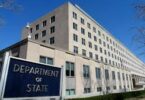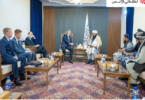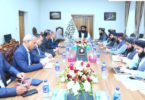KABUL (Tolo News): In 2021, aid from the international community to Afghanistan halted and assets held in foreign banks were frozen, leaving the country’s economy on the brink of collapse. The country’s largest national program, CCNPP, which was aimed at reducing poverty and helping rural areas to develop, was suspended. In the middle of 2021, Afghanistan faced a drought.
Meanwhile, 2021 was not a good year for the aviation sector of Afghanistan. On August 15, all commercial flights were suspended and hundreds of passengers returned home from Kabul Airport even though they had visas and passports. When the former government collapsed on August 15, people flocked to banks in Kabul and in the provincial centers and the private and public banks faced a shortage of cash.
“Afghanistan’s economy plunged, causing a major humanitarian crises after the Taliban took power, with the financial aid being suspended and the freezing of national assets in 2021,”said Seyar Quraishi, an economist. In 2021, the United States Department of the Treasury froze more than $9 billion of Afghanistan’s assets, and on the August 15–the day when Islamic Emirate took power– all the country’s banking transactions with the world were cut off.
“Banks have their own problems, the activity of the Asian Development Bank–which was providing salaries for a number of employees–have been halted and most of the half-finished projects from the previous government have been suspended,” said Din Mohammad Hanif, acting Minister of the Economy. In 2021, Afghanistan’s currency faced sharp fluctuations.
Based on the statistics of the former acting governor of the central bank of Afghanistan, which he posted on his Facebook page, before the fall of the previous government, one US dollar was exchanged at the following rates: 36 days before the fall of the former government, one dollar was exchanged for 78 Afs. Thirty days before the collapse, one dollar was exchanged for 93 Afs, and a week after the political change, one dollar was exchanged for 102 Afs.
At one point the value of the afghani against the dollar plummeted, with one dollar being exchanged for 130 Afs. “In 2021, we did not have good memories of the value of the afghani, Afghan currency was losing its value day by day the entire year,” said Abdurahman Zirak, spokesperson of the Money Exchangers Union at Sarai Shahzada.
In 2021, the World Bank suspended all its projects to Afghanistan, and its largest program, the $1 billion Citizen’s Charter National Priority Program (CCNPP), was also halted. In the later months of the year, the United Nations Development Program (UNDP) reported that nearly 97 percent of the population of Afghanistan would go under the poverty line.
This year, hunger and rising of unemployment forced thousands of Afghans to flee to Iran and Pakistan to find jobs. “After the political change, all aid agencies cut off their aid to Afghanistan, there were a lot of problems in the country,” said Ahmad Wali Haqmal, spokesperson for the Finance Ministry.
At the the start of the year, the third wave of Covid-19 caused severe problems for the economy of Afghanistan and work for many businesspeople stopped. The economy in rural areas of the country, which relied on agriculture, was severely affected by drought, and the country’s wheat production decreased by one million tons this year.
Meanwhile, due to the inflation dozens of factories were closed because they faced a lack of raw materials and could only make limited withdrawals from banks to pay for materials or to pay employees. “When production falls, it affects the whole economy of the country. It is clear that the employees lose their jobs, income lowers, and demand falls and it causes the recession of the economy,” said Hasibullah Mowahed, the deputy head of the Central Statistics Organization (CSO).
Despite the problems and challenges, the Afghan Ministry of Finance reported that for the first time the country’s budget has been prepared without relying on foreign aid, and that the regular budget will come from domestic revenue. Meanwhile, the past year will be remembered as a momentous year for Afghanistan and its people, beginning with a fragile peace process and then witnessing the fall of the Western-backed government of Ashraf Ghani.
The second round of negotiations between the Afghan negotiating team and the Islamic Emirate’s Qatar-based political office began in 2021 but both sides failed to reach a political settlement. The then US special envoy for Afghanistan, Zalmay Khalilzad, made several rounds of regional visits to Kabul, Islamabad, Doha and other regional countries in a bid to provide a roadmap for peace and a transitional government in Afghanistan.
The former Afghan president Ashraf Ghani and his close aides were strongly critical of Khalilzad’s advocacy for a transitional government. The regional players joined in the new game of Afghan war and peace. They started by inviting a delegation of the Islamic Emirate and discussing the current situation and the future.
The chaos finally ended with the fall of the government and the reemergence of the Islamic Emirate government in Afghanistan. In 2021 there were efforts to bring an enduring peace in Afghanistan that would have included both the republic and Islamic Emirate side, but this is not what happened.
“Peace still remained a hope, we were passed from political structure to political structure–this doesn’t provide political, social, economic stability,” said Samad Karmand, a political analyst. The two Afghan sides held several meetings but failed to make any breakthroughs. Both sides criticized the other for the talks’ failure.
“The efforts didn’t bear a good result due to the pressure of the conflict, and because of certain people in the presidential palace,” said Farkhruddin Qarizada, a political analyst. Khalilzad’s meetings with the Afghan leaders in Kabul and regional countries were mainly focused on the formation of an interim government.
Ghani, however, insisted on holding an election or a Loya Jirga (National Assembly) through which he would hand over power to the next administration. “The transition of power via election is our main principle,” Ghani said. Some sources said that the Islamic Emirate was ready to call a 90-day ceasefire but the negotiations in Doha stalled and did not allow for it.
In March 2021, the US Secretary of State Antony Blinken sent a letter to Ghani and the then chairman of the high council for national reconciliation, Abdullah Abdullah. The letter was initially published by TOLOnews. “These proposals reflect some of the ideas included in the roadmap for the peace process that (NSA) Mohib shared with Ambassador Ross Wilson,” the letter read.
“The documents will enable the Islamic Republic and the Taliban to move urgently to the tasks of developing a)the foundational principles that will guide Afghanistan’s future constitutional and governing arrangements, b) a roadmap to a new, inclusive government; and c) the terms of a permanent and comprehensive ceasefire,” Blinken wrote in the letter. The efforts of the high council for national reconciliation could not boast of any significant progress in the Afghan peace process.
Many Afghan leaders were blaming Ghani for being an “obstacle” in the way of the peace process as he attempted to remain in power, but Ghani and his close aides denied it. According to Mohib, the government was planning to send a negotiating team to Qatar to discuss the transition of power and a peaceful settlement on August 15, the day when Kabul collapsed to the Islamic Emirate.
“Some colleagues and my wife and I were going to the airport to them (our family) in the UAE, and I was going from there to Doha alongside other delegates for negotiations,” Mohib said. Ghani and his close aides fled the country on August 15, leaving the country and the Afghan people facing an uncertain future.
The peace process failed to produce any positive results for the country. The Islamic Emirate took its second turn in power. Of all the major events, the fall of the republic system– the formation of which was considered the most important achievement–is the main historic event of 2021 for Afghanistan and its traumatized people. The fall of the Republic started with overrunning of districts across the country by the Islamic Emirate. The Islamic Emirate forces within weeks stormed into the provincial centers.
2021 was a bloody year for the Afghan nation, with the government and Islamic Emirate forces fighting in battles across the nation to gain leverage at the negotiation table of the ultimately failed peace process. On May 20, 2021, Dawlat Shah district of Laghman was the first to fall into the hands of the Islamic Emirate forces; this was followed by the rapid fall of districts across the country.
On July 6, 2021, Foreign Minister Mohammad Hanif Atmar confirmed the fall of at least 80 districts. Many of the districts were overrun by the Islamic Emirate as part of the Ghani administration’s “tactical retreat” plan. “The individuals appointed to military leadership were not experienced with the Afghan war,” said ANDSF spokesman Omar Shinwari.
On August 6, 2021, Zaranj, capital of the southwestern province of Nimruz, was the first provincial center to collapse. Powerful Afghan leaders attempted to use their influence among the people to resist the Islamic Emirate offensives, but they were ultimately unsuccessful. Marshal Abdul Rashid Dostum, the leader of Hezb-e-Junbish, and Ata Mohammad Noor, leader of a splinter faction of the Jamiat-e-Islami party, traveled to Balkh province to fight the Islamic Emirate forces, but both fled the province and the provincial capital Mazar-e-Sharif collapsed.
“Even if I die, it is an honor for me. We will not abandon this nation,” Dostum had previously said. Within weeks, the Islamic Emirate entirely took control of Afghanistan. According to the Washington Post, around 4,000 Afghan Security Forces were killed and 1,000 disappeared between May 1 and August 15, 2021.
Based on available statistics, at least 92,000 members of the Republic’s security forces lost their lives in combat since 2001. “This collapse is affecting Afghanistan. The regional countries don’t want Afghanistan to have a strong military,” said Gen Sadeq Shinwari, a military veteran. The Resistance Front in Panjshir province fought for a couple of weeks after the fall of Kabul, but the Islamic Emirate eventually claimed that the open resistance in Panjshir had been quelled.






